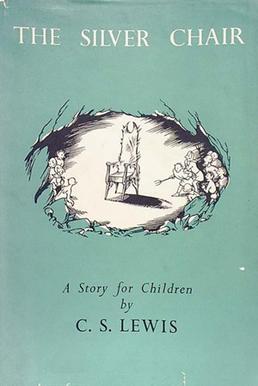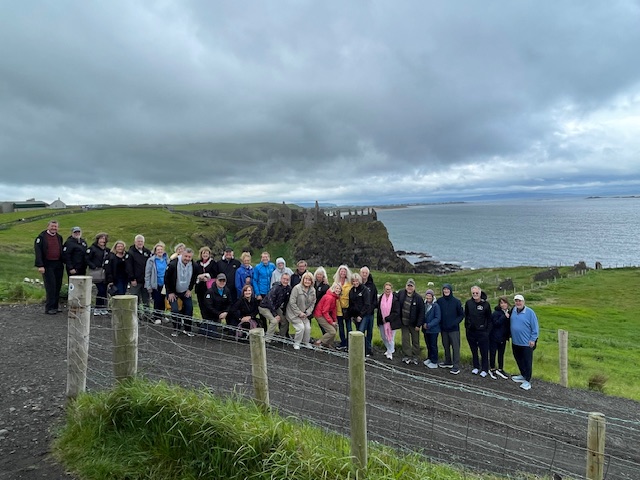Remember the Signs!
July 24, 2025

C.S. Lewis Devotional No. 3: Remember the Signs!
When the people of Abraham are freed from Egyptian captivity, the Lord provides them direction through commandments given first to Moses and then to the people. Those of us who are familiar with the Old Testament texts and stories know that God provided the 10 Commandments and prioritized two: “Love the Lord your God with all your mind, soul and heart,” and the second, “Love your neighbor as yourself.”
We also learn from Israel's history that they frequently forgot the Lord’s words and commands. Their flourishing – in every sense, not just financially – was directly tied to remembering what they were to “love.” In Deuteronomy 6:6-8, the Lord emphasized this, stating, “These commandments that I give you today are to be on your hearts. Impress them on your children. Talk about them when you sit at home and when you walk along the road, when you lie down and when you get up. Tie them as symbols on your hands and bind them on your foreheads. Write them on the doorframes of your houses and on your gates.”
Loving the Lord and your neighbor was always to be on your minds, in your conversations, and in the relationships that you had every day. The Lord knew, perhaps because the adversary, the devil, is walking about seeking people to devour, that it would be difficult to hold to these commitments. Thus, the practice of remembering was essential to living a life of discipleship that reflected God’s promises. Those who forget live aimlessly at best and move in the wrong direction at the worst. At least in God’s kingdom, remembering the signs is important.
 In The Silver Chair, another Narnian adventure, remembering specific signs becomes crucial for the mission’s success. This time, Eustace Scrubb (who we’ll discuss more later) and Jill Pole are tasked with recovering Prince Rilian.
In The Silver Chair, another Narnian adventure, remembering specific signs becomes crucial for the mission’s success. This time, Eustace Scrubb (who we’ll discuss more later) and Jill Pole are tasked with recovering Prince Rilian.
Aslan: “I lay on you this command, that you seek this lost prince until either you have found him and brought him to his father’s house, or else died in the attempt, or else gone back to your own world.”
“How please?” said Jill.
“I will tell you, Child,” said the Lion. “These are the signs by which I will guide you in your quest. First, as soon as the Boy Eustace sets foot in Narnia, he will meet an old and dear friend. He must greet that friend at once; if he does, you will both have good help. Second; you must journey out of Narnia to the north till you come to the ruined city of the ancient giants. Third; you shall find a writing on a stone in that ruined city, and you must do what the writing tells you. Fourth; you will know the lost prince (if you find him) by this, that he will be the first person you have met in your travels who will ask you to do something in my name, in the name of Aslan.”
. . . “But the first step is to remember. Repeat to me, in order, the four signs.”
For Jill, the rules or guidelines fall into several general categories.
First, she must remember who she is to meet. Aslan simply states, “You will meet an old and dear friend.” As is true of Jill, our journeys are often aided by friends who have deep wisdom and faith.
 Ruth and I recently took a trip called the Footsteps of Faith, where we guided friends into the “footsteps” and the paths of C.S. Lewis, J.R.R. Tolkien and many others. Many of the people on the trip came because of our trusted friend, Steve Moore. It is also true of the university – perhaps, the mission of the university is best expressed in the relationships mentors develop with students. Those mentors are genuine guides. When I talk with graduates, they most often talk about the people at George Fox and rarely talk about the information they garnered.
Ruth and I recently took a trip called the Footsteps of Faith, where we guided friends into the “footsteps” and the paths of C.S. Lewis, J.R.R. Tolkien and many others. Many of the people on the trip came because of our trusted friend, Steve Moore. It is also true of the university – perhaps, the mission of the university is best expressed in the relationships mentors develop with students. Those mentors are genuine guides. When I talk with graduates, they most often talk about the people at George Fox and rarely talk about the information they garnered.
Recently, I was traveling in Houston, Texas, and I met Nathan Sundgren, who is a doctor at Baylor University College of Medicine. When we talked about his memories of George Fox, he consistently talked about people he met here such as Dwight Kimberly and Don Powers. In some difficult times in his life, these George Fox people had provided support and wisdom that made the difference in key moments.
Second, the direction of travel was vital. In Christian circles, we often refer to this as “God’s calling.” Sometimes “calling is about what you do, but it is also about where you are called to work.” Jill had to leave the safety of Narnia and journey to a place that she did not know. In Lewis’ stories, the children always receive a challenge, and it usually means that they are going to be uncomfortable. They are going to see new places and meet new people. It is going to be “risky,” but at the same time, the risk has the potential of leading to greater trust and transformation. Aslan pushes the children to grow in character and faith on their journeys.
It’s the same for us, isn't it? Our lives are lived amidst risk and challenge. Certainly, countless philosophers have debated why suffering and challenge exist in a God-designed world. For this discussion, let’s simply assume we’re in a divine drama, each with a role to play. God created us and assigned us tasks to advance his kingdom here. Part of life’s journey involves taking on these God-given challenges, making the journey itself inherently risky. The Bible consistently honors those who step out and take such risks.
 One of the essential purposes of George Fox University's mission is to help students identify their “where” – discovering how God has equipped them and where he intends them to serve. Like the friend Jill seeks, we aim to be the mentors our students need to find their God-given place in the world. Whether in Narnia or in life, we are all part of a larger story and asked to play our role.
One of the essential purposes of George Fox University's mission is to help students identify their “where” – discovering how God has equipped them and where he intends them to serve. Like the friend Jill seeks, we aim to be the mentors our students need to find their God-given place in the world. Whether in Narnia or in life, we are all part of a larger story and asked to play our role.
Third, words matter, and the stories of the Bible are vital to God’s people. Just as in Narnia, words carry weight in the biblical narrative. My great hope is for our students to deeply know the book we call the Bible. It is the passionate story of the relationship between the God of the universe and his people. Created male and female in his image, he has called us to walk with him in this world to join the great drama of building his kingdom. In Psalm 119:105, the writer noted, “Your word is a lamp to walk by, and a light to illumine my path.” God has been at work since the beginning of time. We are not alone. The stories of the Bible are presented to us to encourage, to teach, and to provide direction. God calls you not only to read it but also to enter the story. As the Bible says, “write on your heart” the words and stories that truly matter.
Finally, even though the journey may be risky and we have lots of challenging assignments, God promises us that he will be with us. While Jill was called to work in the name of Aslan, we work in the name of Jesus. Paul said it this way in Philippians 2: 9-11: “As a result God exalted him and gave him the name that is above every name, so that at the name of Jesus every knee shall bow – in heaven and on earth and under the earth – and every tongue confess that Jesus Christ is Lord to the glory of God the Father.”
As I read the New Testament, I am often reminded of the work that Jesus calls us to do in his name. Perhaps the most poignant request was the one he requested of Ananias. “Ananias, get up and go to the street called ‘Straight,” and at Judas’ house look for a man from Tarsus named Saul. For he is praying …” You know the story, I am sure. Saul, one of the key leaders who was persecuting early followers of Jesus, met Jesus on the road to Damascus. Ananias, of course, did not know that. He only knew Saul as the man who was killing Christians. Yet, God calls him to do something in his name. It is not a “safe” call – it is a demanding call. God does not call us to “safety” but to engage the battle where he needs us. You can be assured that if the call is in his Name, you will be moving in the direction he has asked.
A Final Warning
Aslan gave Jill a final warning: “I give you a warning. Here on the mountain I have spoken to you clearly: I will not often do so down in Narnia. Here on the mountain, the air is clear and your mind is clear; as you drop down into Narnia, the air will thicken. Take great care that it does not confuse your mind. And the signs which you have learned here will not look at all as you expect them to look, when you meet them there. . . . Remember the signs and believe the signs. Nothing else matters.”
In the Chronicles of Narnia, as in the Bible, there is someone at work trying to subvert the work of Aslan (Christ). Jesus reminded the disciples to be sober and vigilant because their adversary was at work attempting to destroy the work of the Kingdom. Thus, remembering, celebrating and worshiping are all essential aspects of staying on track in your journey. Remember God’s story – nothing else matters.